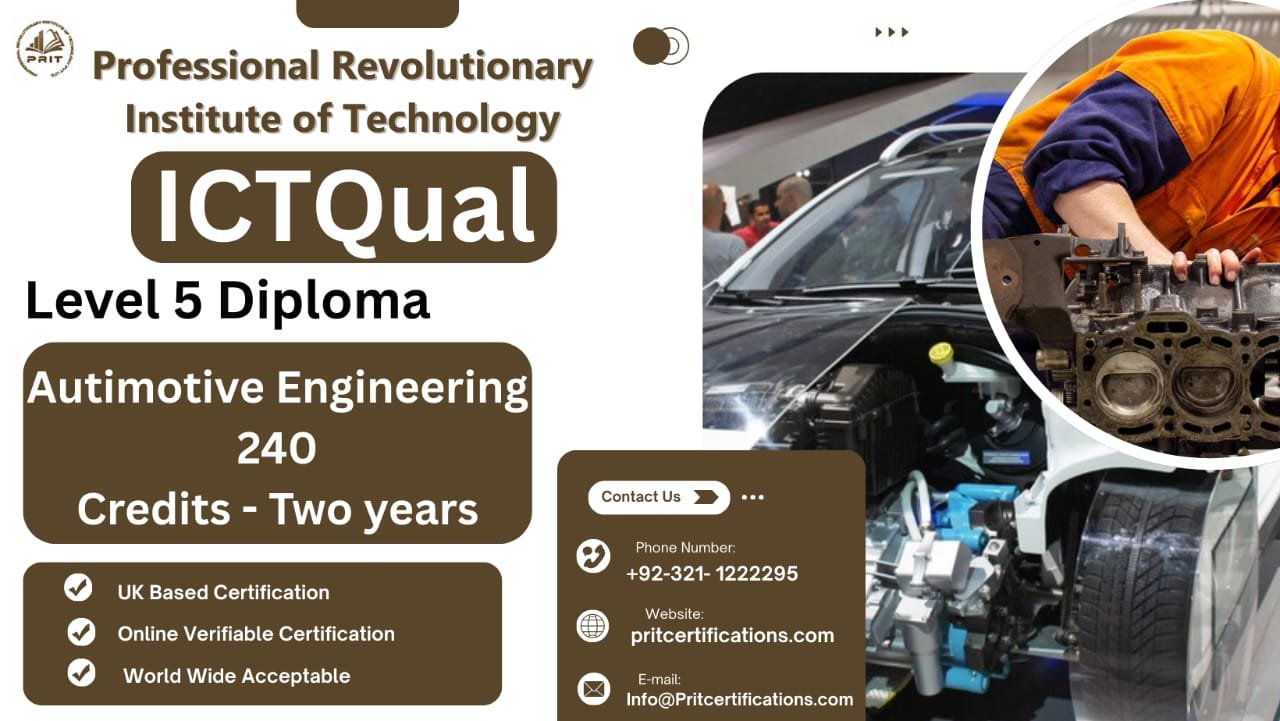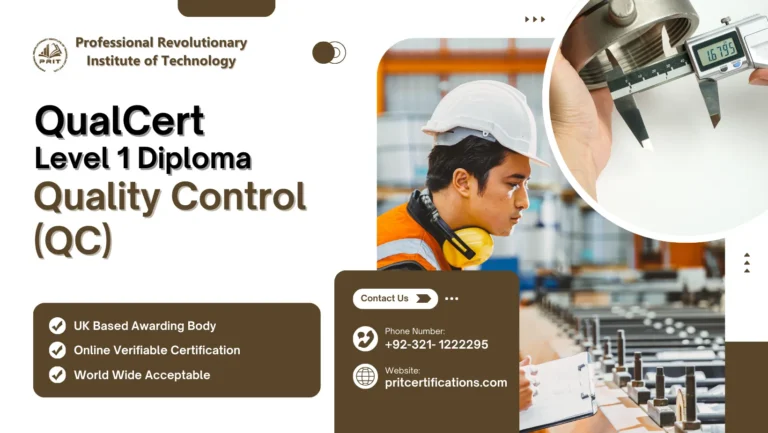
The ICTQual Level 5 Diploma in Automotive Engineering offers an exceptional opportunity for individuals aspiring to advance their knowledge and skills in the dynamic field of automotive technology. Designed to be completed over two years, this comprehensive program equips learners with the technical expertise and problem-solving abilities required to excel in the ever-evolving automotive industry.
The curriculum integrates theoretical knowledge with hands-on practical experience, allowing students to delve into the intricacies of vehicle design, manufacturing processes, and maintenance systems. Topics covered include automotive electronics, powertrain systems, vehicle dynamics, and sustainable automotive technologies. This holistic approach ensures that graduates are well-prepared to tackle the challenges of modern automotive engineering.
Participants in this diploma program gain exposure to cutting-edge tools and methodologies employed in the industry. From computer-aided design (CAD) software to advanced diagnostic systems, the course emphasizes practical proficiency alongside academic rigor. This dual focus enables learners to seamlessly transition from the classroom to the workplace, making them valuable assets to automotive firms worldwide.
A key highlight of the program is its emphasis on innovation and sustainability. As the industry shifts toward electric and hybrid vehicles, students are introduced to the latest advancements in green automotive technology. This forward-thinking approach ensures that graduates remain at the forefront of the industry’s transformation toward eco-friendly solutions.
Upon successful completion of the two-year diploma, learners can explore diverse career paths, including roles in automotive design, systems engineering, production management, and quality control. Additionally, the program provides a strong foundation for those wishing to pursue further studies or specialize in niche areas of automotive engineering.
The ICTQual Level 5 Diploma in Automotive Engineering is ideal for those passionate about vehicles and driven to innovate. With its blend of academic depth, practical training, and focus on future-ready technologies, the course stands as a premier choice for aspiring automotive professionals.
Invest in your future today by embarking on a journey toward automotive excellence. Whether you are a recent school graduate or an industry professional seeking to enhance your expertise, this diploma provides the knowledge and skills to drive your career forward in the competitive world of automotive engineering.
Entry Requirements
To enrol in the ICTQual Level 5 Diploma in Automotive Engineering, candidates must meet the following entry requirements:
- A minimum of a Level 4 qualification (e.g., HNC, NVQ Level 4, or equivalent) in a related field such as automotive engineering, mechanical engineering, electrical engineering, or a similar technical discipline. A strong foundation in basic engineering principles is essential, as the course builds on these concepts and introduces more advanced automotive engineering topics.
- Learners minimum age of 16 years to enroll in the course.
- Proficiency in English, as the program involves technical terminology, written assignments, and effective communication within the context of automotive engineering.
- A solid understanding of mathematics and physics, particularly in areas related to mechanics, thermodynamics, and electrical systems, as these subjects are fundamental for success in the course.
- Basic knowledge of automotive systems and tools, including vehicle components, diagnostics, and repair techniques, is recommended to help learners engage more effectively with the curriculum.
Study Units
Year 1 – Foundation and Core Skills (120 Credits)
- Introduction to Automotive Engineering
- Fundamentals of Vehicle Mechanics
- Electrical and Electronic Systems in Vehicles
- Engineering Mathematics for Automotive Applications
- Materials and Manufacturing Processes
- Vehicle Dynamics and Control
- Thermodynamics and Heat Transfer in Automobiles
- Hydraulics and Pneumatics in Automotive Systems
- Health and Safety in Automotive Engineering
- Professional Skills and Communication
- Introduction to Vehicle Diagnostics
- Sustainable Practices in Automotive Engineering
Year 2 – Advanced Concepts and Specialization (120 Credits)
- Advanced Vehicle Diagnostics and Troubleshooting
- Hybrid and Electric Vehicle Technology
- Autonomous Vehicle Systems
- Advanced Manufacturing Technologies
- Powertrain Design and Analysis
- Aerodynamics in Automotive Design
- Embedded Systems in Vehicles
- Automotive Project Management
- Quality Control and Testing
- Environmental Regulations and Standards
- Final Project – Automotive Engineering Innovation
- Industrial Placement (Internship)
Learing Outcomes
Year 1 – Foundation and Core Skills (120 Credits)
Introduction to Automotive Engineering
- Understand the history, structure, and evolution of the automotive industry.
- Identify career pathways and the role of engineering in automotive innovation.
- Demonstrate knowledge of basic engineering principles applied to vehicles.
Fundamentals of Vehicle Mechanics
- Explain the functioning of engines, transmissions, and drivetrain systems.
- Analyze mechanical failures and propose repair or maintenance solutions.
- Apply mechanical engineering principles to enhance vehicle performance.
Electrical and Electronic Systems in Vehicles
- Understand basic electrical circuits, components, and systems used in vehicles.
- Diagnose common electrical issues using appropriate tools.
- Implement safety procedures when working with electrical systems.
Engineering Mathematics for Automotive Applications
- Apply mathematical techniques to solve engineering problems.
- Use algebra, calculus, and statistics in analyzing automotive systems.
- Demonstrate proficiency in computational tools for engineering calculations.
Materials and Manufacturing Processes
- Understand the properties and applications of automotive materials.
- Analyze modern manufacturing processes and their impact on vehicle design.
- Evaluate material selection for durability and sustainability.
Vehicle Dynamics and Control
- Explain the principles of motion, stability, and handling in vehicles.
- Analyze the effects of forces on vehicle performance.
- Apply control systems to improve safety and efficiency.
Thermodynamics and Heat Transfer in Automobiles
- Understand thermodynamic principles in the context of automotive engines.
- Evaluate heat transfer mechanisms in vehicle systems.
- Design solutions for improving energy efficiency in vehicles.
Hydraulics and Pneumatics in Automotive Systems
- Understand the principles of fluid power systems used in vehicles.
- Diagnose and repair hydraulic and pneumatic components.
- Apply knowledge of fluid mechanics to automotive applications.
Health and Safety in Automotive Engineering
- Identify workplace hazards and implement safety protocols.
- Understand legal and ethical responsibilities in automotive environments.
- Conduct risk assessments to ensure safe engineering practices.
Professional Skills and Communication
- Develop effective technical writing and reporting skills.
- Demonstrate teamwork and interpersonal skills in engineering projects.
- Communicate complex ideas clearly to technical and non-technical audiences.
Introduction to Vehicle Diagnostics
- Use diagnostic tools to identify faults in vehicle systems.
- Interpret diagnostic data to recommend maintenance or repairs.
- Understand the role of software in modern vehicle diagnostics.
Sustainable Practices in Automotive Engineering
- Evaluate the environmental impact of automotive technologies.
- Propose solutions for reducing emissions and waste in vehicle design.
- Understand the role of sustainability in the automotive sector.
Year 2 – Advanced Concepts and Specialization (120 Credits)
Advanced Vehicle Diagnostics and Troubleshooting
- Master advanced diagnostic tools and techniques for modern vehicles.
- Troubleshoot complex faults in mechanical and electronic systems.
- Apply problem-solving skills to optimize vehicle performance.
Hybrid and Electric Vehicle Technology
- Understand the principles of electric propulsion and hybrid systems.
- Analyze the design and functionality of energy storage systems.
- Evaluate the environmental and economic benefits of electric vehicles.
Autonomous Vehicle Systems
- Explore the technologies enabling autonomous vehicles, such as sensors and AI.
- Understand the ethical and regulatory considerations of autonomous systems.
- Analyze the challenges and opportunities in autonomous vehicle development.
Advanced Manufacturing Technologies
- Understand CNC machining, additive manufacturing, and robotics in automotive production.
- Evaluate the impact of advanced manufacturing on efficiency and sustainability.
- Apply modern manufacturing techniques to automotive engineering projects.
Powertrain Design and Analysis
- Design and analyze powertrain systems, including alternative fuels.
- Optimize powertrain performance for energy efficiency and emissions.
- Understand the integration of hybrid and electric powertrains in modern vehicles.
Aerodynamics in Automotive Design
- Analyze the impact of aerodynamic forces on vehicle performance.
- Design solutions to minimize drag and enhance fuel efficiency.
- Evaluate the role of aerodynamics in high-performance and eco-friendly vehicles.
Embedded Systems in Vehicles
- Understand the role of microcontrollers, sensors, and software in vehicles.
- Design and test embedded systems for improved vehicle functionality.
- Troubleshoot issues in vehicle electronics and embedded systems.
Automotive Project Management
- Plan and manage engineering projects using industry-standard tools.
- Evaluate project risks and develop mitigation strategies.
- Lead multidisciplinary teams to achieve project objectives.
Quality Control and Testing
- Understand the principles of quality assurance in automotive engineering.
- Design and conduct tests to ensure vehicle safety and reliability.
- Analyze test results to recommend design improvements.
Environmental Regulations and Standards
- Understand global regulations on emissions and automotive safety.
- Ensure compliance with environmental and safety standards in vehicle design.
- Propose strategies to meet regulatory requirements while maintaining performance.
Final Project – Automotive Engineering Innovation
- Develop an innovative solution to a real-world automotive challenge.
- Demonstrate the ability to integrate knowledge from various disciplines.
- Present project findings effectively to technical and non-technical audiences.
Industrial Placement (Internship)
- Gain hands-on experience in a professional automotive environment.
- Apply theoretical knowledge to practical engineering challenges.
- Develop industry connections and professional skills for future employment.






